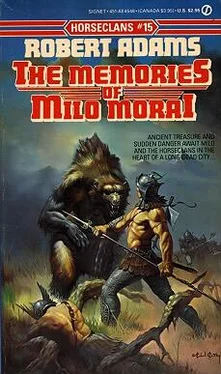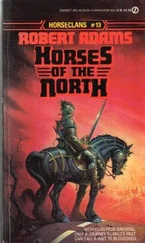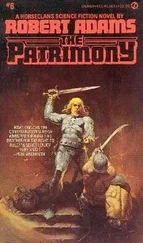“The next morning, a dozen of my men were down, violently ill, feverish, unable to hold even water on their stomachs, racked with cramps and diarrhea. Our medics tried everything they knew or had in the ambulances, but nothing worked; every one of those menwere dead before the second morning. More turned up sick even as we were getting set to bury the first lot, and included in the new cases were both of our medics, leaving us only one trained man, our battalion surgeon, Captain Weeks.
“That loudmouthed fool of an executive officer, Pat Muldoon, had to remark to me in public that the twelve men all had had a part in burying the dead folks we had found when we got there. After that, those few of us who hadn’t panicked had to wrap the bodies in trash bags and plastic sheeting and, finally, cut-up truck-top canvas before any of the others would dump them into graves. Not only that, but it was damned few of the men who would any longer help Doc Weeks tend the sick. They were dying, really, because he couldn’t save or help any of them.
“Sometime around dawn of our second morning there, two hundred and ninety-two men and officers took the best of the remaining trucks, their weapons, most of the ammo and almost all of the food and split out. Muldoon was stricken by then, and it was his shouts and pleas and screams and curses yelled after them for leaving him behind that woke the rest of us up. From the bastard’s ravings before he died, it seems that he was the prime mover in planning the mutiny and mass desertion. I hope the son of a bitch is roasting in the deepest, foulest pit of hell at this very minute!”
Then the rabbit was done and Colonel David Crippen stopped talking for a while.
Milo and Wahrn turned the skinned, gutted and partially butchered deer carcass over to the women, set about first removing the useful hooves and teeth, cracked open the skull and spooped out the brains for use in tanning the hide, then pegged out the hide itself for fleshing and scraping. Everything done, the two men strolled down to the shallows at the edge of the shrinking lake to lave their bodies of the blood and sweat and squashed insects.
As they washed themselves, standing waist-deep in the sun-warmed water, ignoring the brushings and nippings of fingerling fish busy at feeding on the blood and salt sweat on their calves and thighs, Wahrn beamed, “So, please tell me, Milo, what ever happened to this unfortunate officer, this Colonel Crippen? Did he and his men all die of the strange disease, too?”
Milo shook his dripping head. “Not during the weeks I stayed with them, Wahrn . . . though what happened to him and them after that is anybody’s guess, of course. They were the epitome of a hard-luck bunch, but I hope they all got back to Sacramento alive and in one piece.
“I kept them near to where I’d found them, though I did move to a better campsite. Those mountains were aswarm with rabbits that year, so I rigged dozens of rabbit snares, showed them all how to build shelters and bough beds, collected edible wild plants and showed them how to heat rocks in a fire, then use them to simmer a meat-and-plant stew in a green hide. I found a frigid spring-fed stream nearby and badgered them all into washing themselves and their clothing, then did what little I could to aid them in repairing it.
“After a week or so of hot, regular meals, sleep and regular, controlled physical exercise, I marched them slowly, in short stages, south, down to a tiny village I’d swung wide of on my way up into the mountains. The few people still left there were all dead, and animals had been at most of the bodies, so many were by then little more than skeletons, ill concealed by flapping rags. That’s how fast the Great Dyings ran their deadly course, Wahrn; only a week or so before, that village had been active, with armed men standing guard over it, yet bare days later, it was a village of only the dead.
“Dave Crippen made some noises about burials, but I pointed out that his men still might be a little wary of such onerous details and that, in any case, Nature was well on the way to recycling the corpses. The colonel was also stubbornly insistent on contacting his superiors in Sacramento, but all of the village telephones proved to be dead and we could find no way of powering such few radio transmitters as we came across.
“However, the village, small as it was, did provide us with a fair amount of food, some firearms—mostly shotguns, hunting rifles and pistols, though with two or three military-type weapons, as well—modest quantities of ammunition, clothing and boots, tools and utensils, as well as enough rugged vehicles to mount us all and gas to fuel them.
“I headed us south and west, back to the house hidden in the blind canyon. I severely cautioned them all, then led the convoy through my outer defenses, noting as I did so that these defenses had obviously claimed more victims since I had left. But the house, when at last we got to it, proved inviolate; no one had had what it took to get that far in. The blackened, rusting vehicles and the rotted human remnants in my man-traps had vastly impressed the covey of State Military Reserves.
“When we passed one particularly gruesome example of the fate of trespassers on posted land, Crippen gulped and asked,“You built all these things, Mr. Moray? Where in God’s name did you learn to do things this brutal? I’ve figured out days ago that you were ex-military, but I didn’t know that even the Marine Corps would teach such dirty tricks as this to be used in warfare.”
“You learn to do what you have to do to keep your own men alive and kill or incapacitate as many as possible of the enemy in any damned way you can, Crippen,” Milo replied, adding, “I was never a Marine, though I was a U.S. Army Ranger officer . . . among other things.”
When they finally made it out of the brushy woods and into the clearing and the house was visible, Crippen perked up out of his dark brooding and said, “Why, I know this place. I was once at a small conclave of State Military Reserve officers here. I didn’t recognize the approach because the other time I came in by chopper, from up north. This is General Jerry Noonan’s place. You say everybody was dead when you first got here, Mr. Moray?”
“Jerry Noonan?” asked Milo. “Isn’t he that retired type who has been asshole-deep in politics these last few years? I’ve read about him, I think. But where the hell would a retired Army officer get the kind of loot it must have taken to build and outfit a place like this?”
“From his wife,-Mr. Moray—his second wife was one of the heiresses to the Stiles fortune. But I don’t think that money was the only reason he married her, despite rumors to the contrary; yes, she was a bit older than he was, but they seemed quite happy and devoted to each other nonetheless.”
Milo tried hard to repress a shudder as an icy chill ran down the full length of his spine. Which one? Which of the little girls he had adopted, fathered, raised as his own, was that aging woman he had buried here?
Exercising iron self-control, he asked, “You met her, then, Colonel Crippen? Do you recall her Christian name?”
Crippen wrinkled his brows, then responded, “Why ... I believe it was some French name . . . ahh, Gabrielle, I think. Yes, that was it, Gabrielle Stiles Noonan. Why?”
“Oh, no particular reason, just curiosity,” said Milo, but thinking of little Gaby as she had been when first he saw her, riding in a dog cart at the farm in Loudon County, Virginia, more than fifty years ago. And he remembered her as a gangly thirteen-year-old with an achingly beautiful face, competently handling the reins of the big Thoroughbred she sat so easily, greeting him when he returned from the Korean War.
Читать дальше












